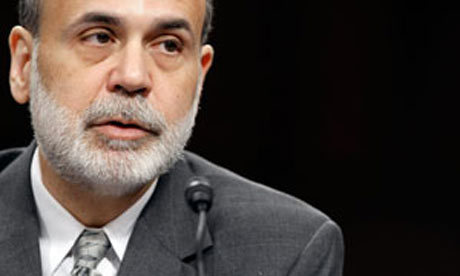By an 11-1 vote, the Federal Reserve Board of Governors signaled deep worry about the economy by pledging an open-ended program to create money and keep interest rates at or near record lows at least through the middle of 2015.
Among other things, the Fed on Thursday announced it would buy $40 billion of mortgage debt per month for an unlimited amount of time.
“If the outlook for the labor market does not improve substantially, the committee will continue its purchase of agency mortgage-backed securities, undertake additional asset purchases, and employ its other policy tools as appropriate until such improvement is achieved in a context of price stability,” the Fed said in a statement.
This money creation represents the third round of “quantitative easing” since 2008.
Zero Interest Rate
The Fed also announced it would extend a commitment to hold the Federal funds interest rate at or near zero well into 2015. The Fed previously had said the zero-interest rate policy that began near the end of 2008 likely would end in late 2014.
Fed Chairman Ben Bernanke said in a press conference after the announcement the policies should strengthen the stock market and prompt more businesses and individuals to borrow money and spark economic activity with more employment.
Critics say such policies punish savers and persons on fixed incomes because they receive virtually nothing for their money. Critics also point out that short-term interest rates and longer-term mortgage rates already are at or near record lows, and prior moves by the Fed to buy government bonds and mortgage securities have failed to generate strong and sustained economic growth.
“QE3 is more of the same, and it will fail just like QE1 and QE2,” said Larry Kaufmann, an economic consultant and senior adviser at Pacific Economics Group in Madison, Wis. “The U.S. economy is not slowing because of a lack of liquidity; it’s due to bad fiscal and regulatory policy. More bond purchases by the Fed won’t do anything to reduce the burdens, distortions and uncertainties of Obamacare or Dodd-Frank, or eliminate Obama’s vow to raise taxes if he’s re-elected. These are the factors undermining investment and job creation.”
At Absolute Investment Management in Bethesda, Maryland, certified financial analyst Michael Lebowitz said he and others in the company were “shocked to hear about the U.S. Fed action” for many reasons including:
- Economic data over the last few months have been stronger than when the Fed did its two earlier rounds of “quantitative easing.”
- Inflation is running higher than when QE1 and QE2 were done.
- Stock markets are near highs.
‘Unlimited Time Frame’
“The unlimited nature of this QE is new to the market. One concern of ours is the unlimited time frame without a framework or benchmark for acceptable employment gains,” Lebowitz said.
“Money supply increases always result in inflation. It takes time, it doesn’t happen overnight, but it always results in inflation unless the money is taken right back, and there’s no sign that’s going to happen,” he said. “It’s all predicated on employment, whereas in the past it was predicated on the economy, which raises the issue if the problem is structural and can even be fixed” by Fed manipulations.
He said the Absolute Investment Management team believes people should expect “a further spike in oil and food prices in the next few months as the commodity markets react to QE. This is detrimental to the lower and middle class, as well as those in emerging and developing countries who spend a large portion of their income on food and energy.”
Lebowitz added, “Bernanke made a comment during his press conference. He said this is for Main Street. What about the Main Street that likes to save money and is earning zero?”
Bernanke said a prime goal of this third round of quantitative easing by the Fed is to boost employment.
However, shortly before Bernanke’s announcement, in an interview with USAWatchdog.com, economist John Williams said that is not the Fed’s prime goal.
“The Fed is just propping up the banks,” he said.
He warned of rapid price inflation to result from the Fed’s actions, probably beginning in 2014.
Political Timing
Some people are also alleging the Fed’s move is politically motivated and aimed at helping to keep President Barack Obama in the White House. Republican challenger Mitt Romney has said he opposes keeping Bernanke as Fed chairman.
“The fact that the Fed is acting a few short weeks before the election is outrageous,” said Bill Wilson, president of Americans for Limited Government. “At best, it indicates they are willing to risk attacks on the central bank’s independence due to the appearance of being political, revealing just how bad the Obama economy really is. At worst, they are desperately trying to juice markets to change the outcome in November. Neither is good.
“Bernanke has fired his last bullet. Since August 2007 when the crisis began, the Fed has increased its balance sheet from $897 billion to $2.865 trillion today, more than tripling it. The federal funds rate has been at near-zero percent since December 2008—all with little to no effect. It could not prevent the market downturn. It has not restored sustainable economic growth. Unemployment is still unacceptably high. If the last $2 trillion of monetary expansion and easy money did not cure markets or restore robust growth, what makes the Fed think another $480 billion [a year] will do the trick?
“Never has so much been done to so little effect. At least, not since Japan did precisely the same thing in the 1990s and 2000s. Just one more exclamation point that Obama’s economy is adrift with no wind in its sails.”





